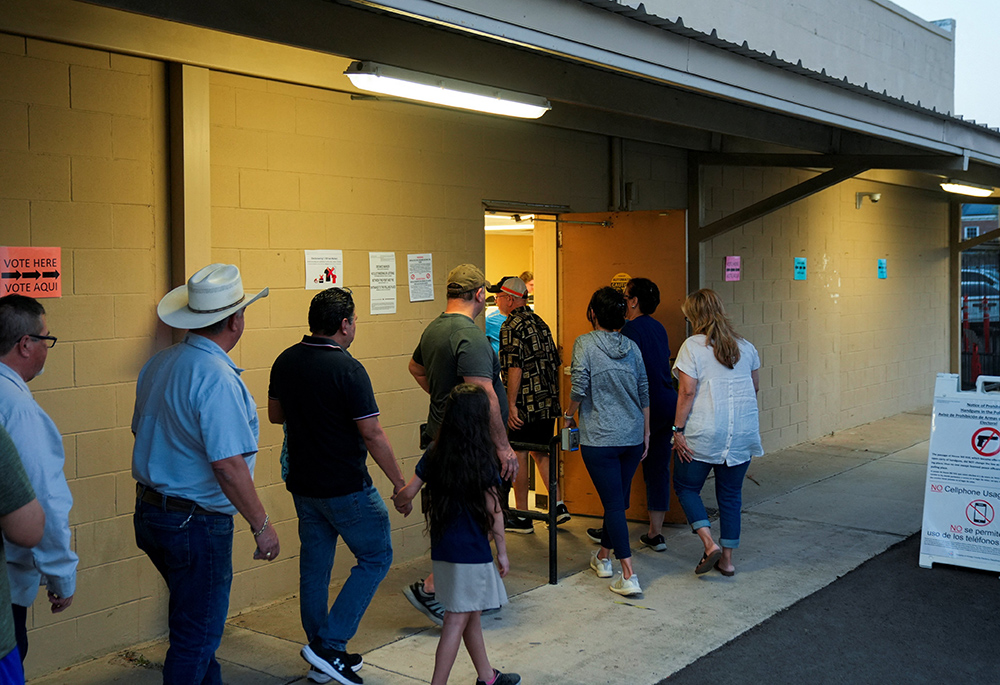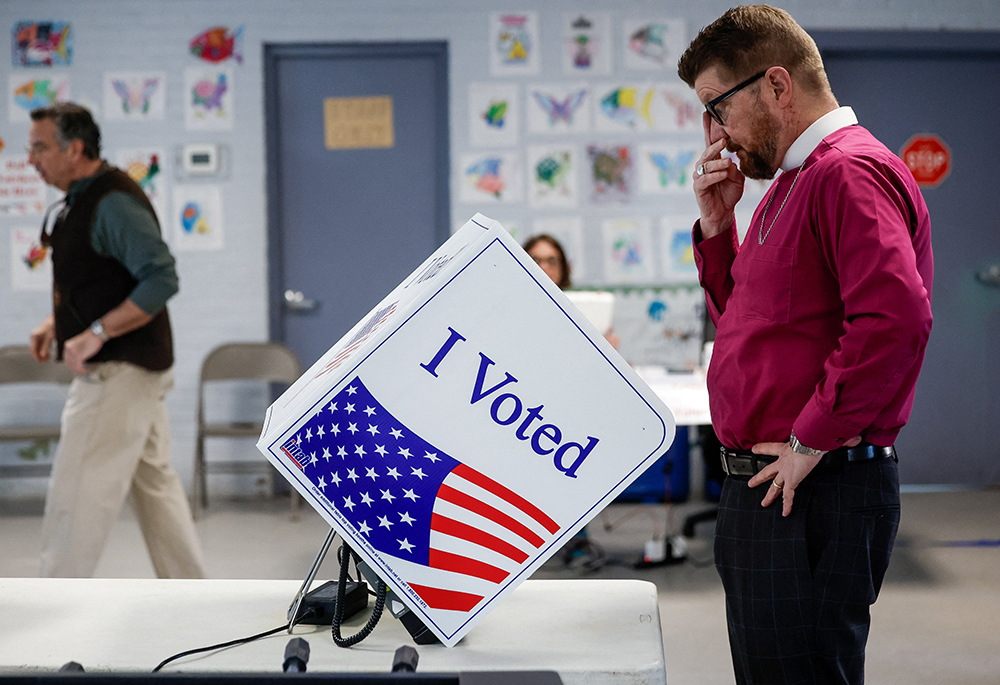
People stand in a line to vote shortly before the polls close in Edinburg, Texas, during the Super Tuesday primary election March 5, 2024. (OSV News/Reuters/Cheney Orr)
The Catholic Church must bear witness to its values in the political square, with more focus on its social justice teaching and not only the issue of abortion, according to a gathering of more than 200 Catholic voters who met online Sept. 7 to discuss the upcoming U.S. presidential election.
The group also called on church leaders to speak out against Christian nationalism and political violence and urged all Catholics to model respectful dialogue with fellow citizens who have different opinions.
"[The] Catholic Church has been active on the one issue of abortion," said a summary of responses shared with NCR. "They need to represent the full range of social justice teachings and issues."
The participants in the online event urged U.S. Catholics to follow Pope Francis' lead in caring for the common good, for immigrants, the poor and the earth. "We need to use actions more than words, as we live out God's love," the summary said.
Participants called for "a focus on service, on social justice — not just charity, but systemic change, as Jesus did."
The event, "Every Catholic Voice: An Election Conversation," was billed as a synodal "conversation in the spirit" modeled after the process used during Pope Francis' synod on synodality. It was co-sponsored by Ignatian Encounter Ministry, Catholic Church Reform International, Catholics Vote Common Good, Faithful America and the Association of U.S. Catholic Priests.
Participants used the "Civilize It" guidelines from the U.S. bishops' conference's Office of Justice and Peace. A final report will be shared with the U.S. bishops and with group participants.

A man casts his ballot at a polling station in Charleston during the South Carolina Republican presidential primary on Feb. 24, 2024. (OSV News/Reuters/Evelyn Hockstein)
Voters broke into small groups to share their hopes and concerns about the upcoming U.S. presidential election and about how their faith and values shaped and informed their views. The small groups then reported back with areas of convergence, divergence and calls for action.
They reported few divergences, except for some disagreements on abortion. One small group reported "we all love human life," but that there was "tension on where we stand on abortion and how to solve it." Another said some disagreed about whether the "right to life" should only focus on abortion or whether a more "seamless garment" approach was best.
Areas of convergence or agreement included concern for the marginalized and the country's social safety net, as well as the need for compassion, care and welcome of immigrants.
Participants also named care for creation as a priority and expressed a desire for an overall emphasis on the common good and the church's social teaching predicated on the dignity of the human person. One group called for "a return to Gospel values."
The church "needs to find its voice, grounded in the Gospel," another group said.
The report acknowledged that abortion is of concern and is "a complex issue" but that it is "one of many issues that have to be decided in the election." Also mentioned was the need to support women in society and in the church.
Voters also acknowledged the difficulty in choosing a presidential candidate when neither fully reflects Christian values.
Advertisement
Several of the small groups also reported fear about divisiveness in the country, and in particular about Christian nationalism. One group expressed "concern for the hatred that is dividing our country" and "how Christian nationalism fosters that hatred."
Another group said: "We believe Christian nationalism has no place in Catholicism, but we are committed to talking with each other, including those who disagree with us."
Also frequently mentioned were concerns about authoritarianism and the future of democracy. "We are in a moment of crisis (a critical moment) in the history of our country and in our Church," one group wrote. Another called for the virtue of hope — "rain in this desert of despair" — in light of the seriousness of the election.
There was widespread disappointment about the church's recent role in politics. One group called the "alliance between bishops and Trump" a "sin" and a "scandal." Others said they were disappointed how the label "Christian" was used in politics "inappropriately, as not in line with Jesus' words and example."
'We are in a moment of crisis (a critical moment) in the history of our country and in our Church,' one group wrote during the online discussion.
One group took issue with the "silence of our bishops on important issues," especially the "hate speech" and divisiveness expressed by politicians. Several participants said the bishops "have lost their leadership and moral authority."
"The Church seems like a dysfunctional family with a toxic atmosphere," this group's report said.
Another group said they hoped for "less dogmatic messaging from the U.S. bishops" and "more emphasis for ALL Catholic social teaching."
An overall theme of the gathering was that the church should be modeling inclusion and respectful dialogue — as was happening in the "Every Catholic Voice" event itself. The church is "called to develop those practices [and] ways of engagement with others who may disagree with us to help prompt more thought on important issues," one group said.
Another urged Catholics to "reach out to friends/family who have different views" and "express our non-judgement and love for them" to "bridge the differences that have formed over the past years due to politics and division."
Such conversations can be difficult — which is why the organizing groups came together to offer the synodal listening event. "None of us would be here if we weren't people of faith who didn't care deeply about this issue," said Rene Reid, director of Catholic Church Reform International.







